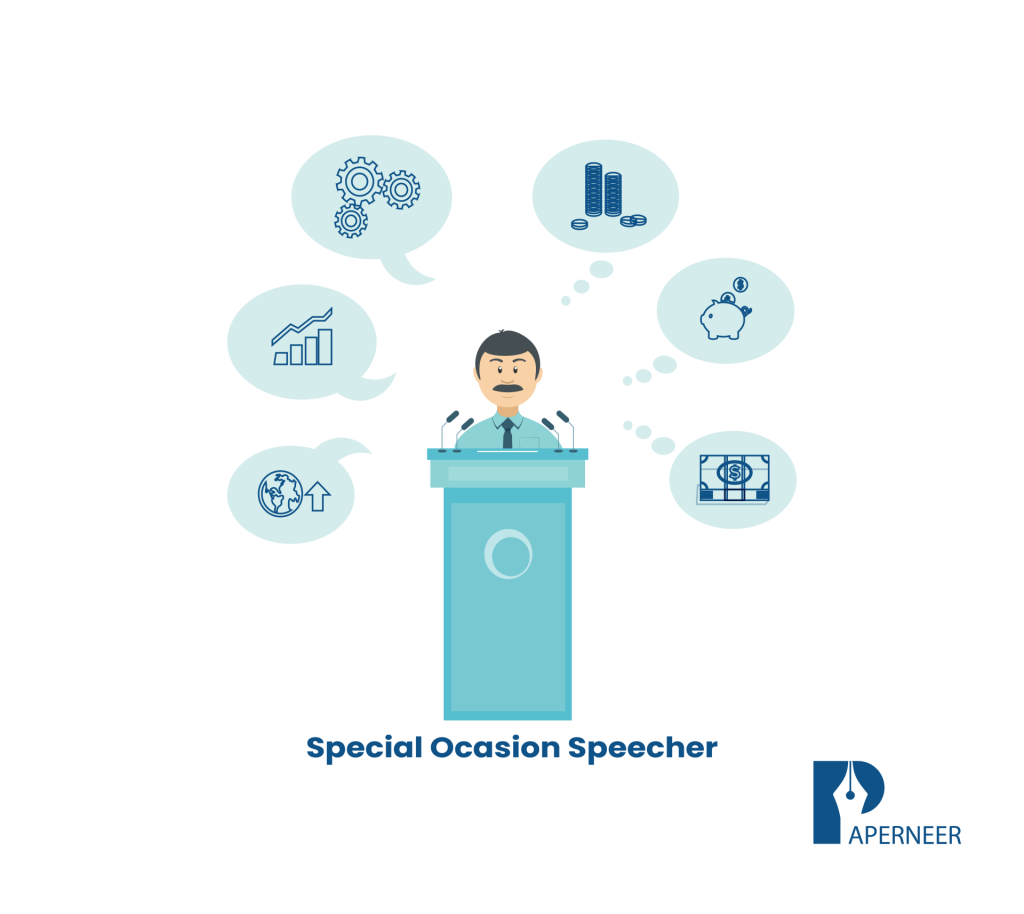Capstone Project – A Complete Guide A capstone project is sometimes the...
Read MoreHow to Write Special Occasion Speeches: Tips and Examples

An occasion always marks special in one’s life. Therefore, it is supposed to be made memorable. A special occasion speech can prove helpful in adding value to the event and making it memorable. If you are eager to write and deliver a special occasion speech, you should have an idea of how it is written. Additionally, you should familiarize yourself with tips and examples. For your understanding, this handout provides tips and examples on how to write special occasion speeches.
This blog Presents:
Defining Special Occasion Speech
A special occasion speech is a type of speech that is delivered at an important event, such as a wedding ceremony, an award distribution event, or a farewell party. It aims to celebrate or honor the event through spoken remarks. Different occasions and events have different speech types; however the main purpose is the same which is to connect with your audience on an emotional level.
Wedding toasts, funeral eulogies, award ceremony acceptance speeches, and retirement farewell speeches are all examples of special occasion speeches. Each type has its own style based on the audience, purpose, and type of occasion. In light of this, it is important to tailor your speech accordingly.
These speeches are often short, focused, and tailored to the occasion. Moreover, they emphasize the importance of the occasion, express gratitude, and share personal experiences or insights. In this way, they help to make the event more meaningful for the participants.
Types of Special Occasion Speech
Introductory Speech:
Introductory speeches introduce a guest speaker to the audience, In addition, they share background information and accomplishments, and help to create a connection between the speaker and the audience. These speeches usually come before the main speech or presentation; subsequently, they play a crucial role in setting the event’s tone. They generate excitement in the audience and make them wait for the speaker’s remarks.
Ceremonial Speech:
Speeches given at ceremonies or formal events are used to introduce and highlight individuals, awards, or accomplishments. The purpose of these speeches is to recognize and honor the recipient’s accomplishments, often with additional information to emphasize their importance.
Award Acceptance Speech:
Individuals receiving honors or recognition at ceremonies or formal events give acceptance speeches. These speeches give the recipient an opportunity to say thank you, acknowledge supporters, and reflect on the significance of the award or achievement.
Toast:
A toast is a short speech or expression of good wishes given at a social gathering or celebration to show respect. It is a sign of respect, admiration, or congratulations and is usually delivered by raising and toasting.
Eulogy:
A eulogy is an oral tribute given at a funeral or memorial service to honor and pay tribute to the life of a deceased person. It functions as a heartfelt tribute, offering thoughts, stories, and sentiments that truly embody the person being commemorated. Eulogies are speeches given on special occasions where family, friends, or colleagues can express their love, respect, and appreciation for the deceased. At the same time, they can provide comfort and support to their relatives.
Roast:
A roast is a light-hearted and funny tribute or speech given to honor and playfully tease a guest of honor, usually at a social gathering or celebratory occasion. A roast is distinguished from other types of speeches by its humorous and teasing style, which aims to entertain the audience while expressing love and gratitude for the person being toasted.
Farewell Speech:
A farewell speech is a formal or informal message from someone leaving a group, organization, or community, often to say goodbye, show appreciation, and remember moments shared. The speeches provide the speaker with an opportunity to show gratitude, offer support, and say goodbye to colleagues, companions, or family members. In addition, they can help create a sense of closure.
How to Write a Special Occasion Speech, Tips?
The tips and examples for writing your special occasion speech can better help you craft an effective speech. For your understanding, the tips are given below:
Understanding the Occasion:
The first step to writing a special occasion speech is to understand what occasion it is that you are giving a speech for and what the nature of the event is. Consequently, understanding this will help you identify the context of your message and what you are going to present through your speech.
Decide on Your Message:
Identify the central message that you want to convey through your speech to the audience. The message could be inspirational, about a celebration of an achievement, or honoring someone’s memory. Set a central theme for your message to keep every idea tied together.
Gather Content:
Try searching for content regarding your theme and central message. For instance, you can collect relevant stories, memories, or anecdotes that make your speech engaging.
Create an Outline:
Once you’ve gathered all your relevant content, draft an outline to start structuring your speech. Make sure to put the content right in its place as per the structure or outline of your speech.
Write Your Speech:
This stage involves developing your speech in written form to give clarity and organization to your ideas. Try keeping your written material concise and brief and make sure to use simple language.
Revise and Edit:
Proofread your written speech. Moreover, consider seeking feedback from a trusted friend or colleague. Rectify them and finalize your speech draft.
Practice and Rehearse:
After the writing part is finalized, start practicing and delivering your speech. Focus on your tone, poise, accent, pronunciation, pace, gestures, and body language. Practice multiple times until you are confident enough that you are ready to deliver in front of your audience.
Graduation Special Occasion Speech
The following is a sample for a graduation special occasion speech.
Hello, Ladies and Gentlemen!
It brings me immense joy to stand before you and express my deep gratitude to each of my esteemed faculty members and fellow graduates.
Expressing one’s feelings on events that hold such significance and value can be quite difficult to put into words. On my graduation, I would like to thank all my respected instructors and supervisors for their supervision and support throughout my academic journey. A graduation marks an event of importance for it paves the way for a more professional and tough life ahead.
Satisfaction comes from the feeling that you have given your best for your achievements. This is why, I am satisfied enough with my dedication towards my efforts and hard work to make it this far. Getting it till here was never an easy task. Rather, I have had a roller coaster ride, sleepless nights, and unforgetful memorable times throughout this journey.
I dedicate my distinction to my parents for they have always extended their moral, financial, and psychological support to me. I would like to extend my gratitude to my supervisors for their unwavering support of my research journey.
Finally, this is the end of an era. However, it is the first step to a more professional life.
Thank you so much all indeed.
Farewell Speech Example
Good evening everyone!
Today is a bittersweet moment and that is evident from our faces and expressions. As I stand here to say goodbye, I want to thank you from the bottom of my heart for the incredible memories, support, and friendships I have made here. It has been a fantastic journey full of growth and learning, and I will cherish the memories we have created.
As I look back, I realize how much we have all grown together, not only professionally but also personally. We have overcome obstacles, celebrated successes, and learned from each other. You have all had a unique impact on my life, and I will always be grateful for that.
As I embark on new adventures, I will take with me the lessons, laughter, and shared experiences we have built. While this departure signifies the end of a chapter, I hope it will not be a final goodbye but rather a “see you soon” one day.
May we all continue to strive for excellence and pursue our aspirations, wherever they may lead us. I wish each of you continued success, happiness, and joy in your future endeavors. Remember, goodbyes do not last forever; they only indicate that we will meet again, somewhere, at some point. Thank you and best wishes!
Special Occasion Speech Topic Ideas
As you have already been briefed about tips and examples on how to write special occasion speeches, you can start crafting your own speech. There could be many topic ideas for special occasion speeches, depending on the occasion or the event you are participating in. Following are some of the topic ideas for different types of occasions:
- For Wedding Ceremonies:
1) You can talk about how marriage is a beautiful journey in one’s life.
2) If you are a close acquaintance of the groom or bride, you can share your cherished memories with them.
3) The couple’s love story.
4) Advice for a happy marriage.
- For Funerals:
1) Sharing the deceased’s virtues.
2) Common memories you have had with the deceased.
3) Looking back on how the deceased’s presence impacted the lives of others.
4) Presenting words of grief for the deceased’s family and friends.
- For Retirement and Farewell:
1) Recounting shared experiences and lessons learned.
2) Expressing gratitude to mentors, peers, or the organization.
3) Highlighting what you will miss the most.
4) Looking back on personal development throughout the tenure.
- For Award Distribution Ceremony:
1) Acknowledging and thanking those who helped you achieve the award.
2) Considering the significance of the award and its impact.
3) Sharing personal stories or struggles that led to the achievement.
4) Inspiring others to pursue their dreams.
- For Graduation Speech:
1) The importance of embracing change and new opportunities.
2) Looking back on the growth and challenges experienced during school years.
3) Sharing the value of lifelong learning and curiosity.
4) Acknowledging mentors, family, and friends who supported the journey.
Say goodbye to Mistakes in Term Papers
Avoid Errors in Term Papers Writing a theme may be a vital tutorial task that needs careful designing and...
Read MoreUnraveling the Stories: Autobiography vs Biography
Autobiography vs Biography Understanding the excellence between autobiography and biography is crucial for...
Read More




